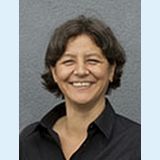
Department of Medicine I
Position: Professor
ORCID: 0000-0001-9016-5244
T +43 1 40400 51390
sylvia.knapp@meduniwien.ac.at
Keywords
Immunity, Innate; Inflammation; Macrophages; Pneumonia; Sepsis
Research group(s)
- Infection Biology Research Lab
Head: Sylvia Knapp
Research Area: Endogenous modulators of inflammation; Macrophage plasticity in bacterial lung infections; Co- and Super-Infection
Members:
Research interests
We focus on a better understanding of the modulation of innate immune responses during clinically relevant bacterial/viral infections and inflammatory diseases. The main focus is placed on the biological function and plasticity of macrophages in tissues infected by pathogens or injured in the course of inflammation. The long term objective pertains to an improved assessment of the regulation of inflammatory processes in order to identify novel therapeutic and diagnostic targets.
Grants
- Chromatin Landscapes (2017)
Source of Funding: FWF (Austrian Science Fund), Special Research Programmes (SFB)
Principal Investigator - Haploid genetics, genome editing and pneumococcal recognition (2014)
Source of Funding: FWF (Austrian Science Fund), ERA-Net; Infect-ERA
Coordinator of the collaborative project - Immunothrombosis (2014)
Source of Funding: FWF (Austrian Science Fund), Special Research Programmes (SFB)
Principal Investigator - Cell Communication in Health and Disease (2010)
Source of Funding: FWF (Austrian Science Fund), Doctoral Programs (DK)
Principal Investigator
Selected publications
- Starkl, P. et al., 2020. IgE Effector Mechanisms, in Concert with Mast Cells, Contribute to Acquired Host Defense against Staphylococcus aureus. Immunity, 53(4), pp.793–804.e9. Available at: http://dx.doi.org/10.1016/j.immuni.2020.08.002.
- Cohen, M. et al., 2018. Lung Single-Cell Signaling Interaction Map Reveals Basophil Role in Macrophage Imprinting. Cell, 175(4), pp.1031-1044.e18. Available at: http://dx.doi.org/10.1016/j.cell.2018.09.009.
- Saluzzo, S. et al., 2017. First-Breath-Induced Type 2 Pathways Shape the Lung Immune Environment. Cell Reports, 18(8), pp.1893-1905. Available at: http://dx.doi.org/10.1016/j.celrep.2017.01.071.
- Martins, R. et al., 2016. Heme drives hemolysis-induced susceptibility to infection via disruption of phagocyte functions. Nature Immunology, 17(12), pp.1361-1372. Available at: http://dx.doi.org/10.1038/ni.3590.
- Warszawska, J.M. et al., 2013. Lipocalin 2 deactivates macrophages and worsens pneumococcal pneumonia outcomes. Journal of Clinical Investigation, 123(8), pp.3363-3372. Available at: http://dx.doi.org/10.1172/JCI67911.